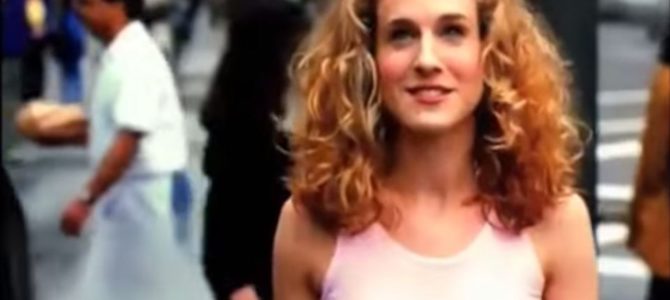
“Some people are settling down, some people are settling, and some people refuse to settle for anything less than butterflies.”
“The most exciting, challenging and significant relationship of all is the one you have with yourself. And if you find someone to love the you you love, well, that’s just fabulous.”
— Carrie Bradshaw
This month marks the twenty-year anniversary of the iconic television series “Sex and the City.” With smart writing and fantasy fashion, it’s easy to see why the show was beloved. It featured an irresistible ensemble of women strutting down the street, heads thrown back in laughter, looking forward and looking fabulous, unmoored, but somehow seemingly on course. Carrie Bradshaw was winsome, witty, and chic — imperfect, yet perfectly enviable. In watching her, fans had a sneaking feeling that they might be living the wrong life, and that somewhere bright city days filled with brunches and purses, brownstones and love affairs awaited them.
In the same way that the show had an outsized influence on women’s fashion, so too did it influence their behavior. Inevitably, there was a vast gulf between how Carrie’s life seemed and how it translated into reality for her fans. Casual hook-ups after a night of drinking Cosmos is decidedly less glamorous in real life. The material aspiration encouraged by the show is imprudent for all but an elite few. Even fewer can sustain the licentious sexuality without lasting physical and emotional wounds. The societal physics of a growing hookup culture result in an increasing number of men who are coarse and entitled and women who feel used and discarded.
Sophisticated moderns think of “Leave it to Beaver” as a contrived reflection of a societally imposed, but ultimately unfulfilling domesticity. We should now see “Sex and the City” as the “Leave it to Beaver” of the sexual revolution: a glossy representation at odds with the sad reality on the ground. Our new conception of the good life for women as highly ambitious sexual libertines has created a generation of Stepford single girls pantomiming a life of glamor that can feel as hollow as it does harmful.
The show’s stepchild, “Girls,” was in many ways a response to this inauthenticity. While reflecting the real sadness and complexity that stems from a hook-up culture, it reassured women that this is just the cost of their empowerment. But reflecting reality turns into validating it, which quickly becomes normalizing it. What we do not get from either of these shows is a way out of that reality.
If there’s a way out it’s in questioning our presuppositions about sex. What have women gained from this experimental reorientation of our understanding of how men and women ought to live and love? That’s the discussion we need.
The traditional understanding of sex is based on the nature of the act itself which has as its purpose the goal of emotionally and physically uniting two people and establishing families. It’s life-giving both in the way it demands each person give his or her entire life to the other permanently and unreservedly, and in the quite literal way in which lovers give their whole bodies to one another and create children, further bonding the two. Trying to use it as a means of narrowing down potential life partners denies the very nature of sex. Hook-ups confuse our ability to assess potential partners by creating unwarranted emotional attachments and the inevitable trust issues that come with the dissolution of every love affair.
Still, the answer isn’t to simply look backward. Correctives were needed for the “Leave it to Beaver” world. There was surely some repression and dysfunction in the old domesticity, and in certain ways male and female relationships can truly be said to be healthier now. But a corrective that rejected the intelligible nature of the act of sex has left a culture disoriented and dysfunctional in ways that are far more difficult to repair the further unmoored we become.
Yet still the revolutionaries insist it be taboo to even question the tenets of the sexual revolution. They’ve replaced dogmas built on nature with dogmas built on will: the good is determined merely by my act of choosing it. This sets us up for a clash of wills as we’ve seen painfully in the revelations of the #MeToo movement.
But nature has a way of having the last word over even the strongest of wills. Pleasure as a highest good quickly becomes elusive. Any man digging down into a rabbit hole of porn addiction can attest to that. We create a society of boorish men then complain about the diminishing pool of marriage prospects. Virtue is difficult for everyone, but it becomes impossible if it’s not even identified as a goal worthy of pursuit. Without virtue, we lose the ability to freely choose what we ought.
The sexual revolution promised freedom, but ended up enslaving its advocates and their acolytes alike. In its wake are generations of victims and layers of injustice. One bubbly television show is certainly not to blame for all of this. It came years after the revolution had firmly embedded into the culture. But in giving an enticing yet profoundly dishonest picture of what such a life would be like it surely multiplied the revolution’s effects.









